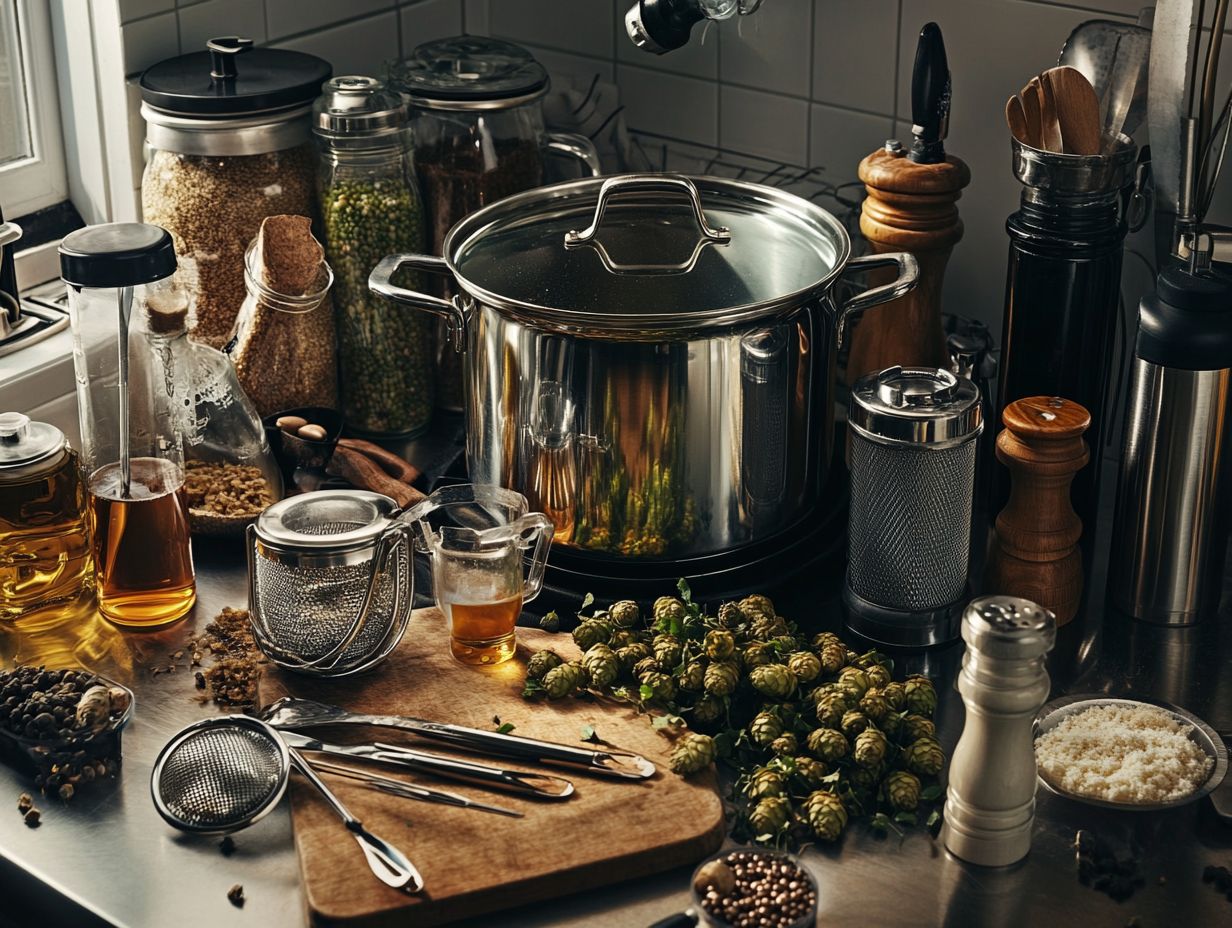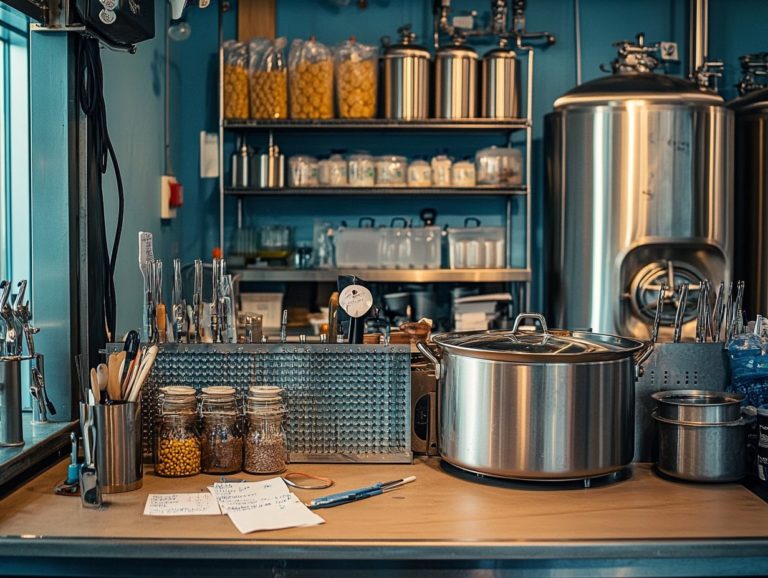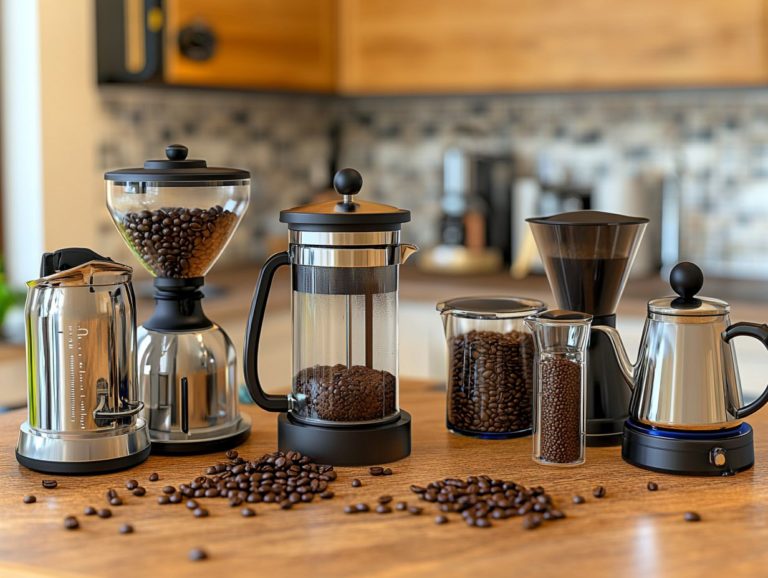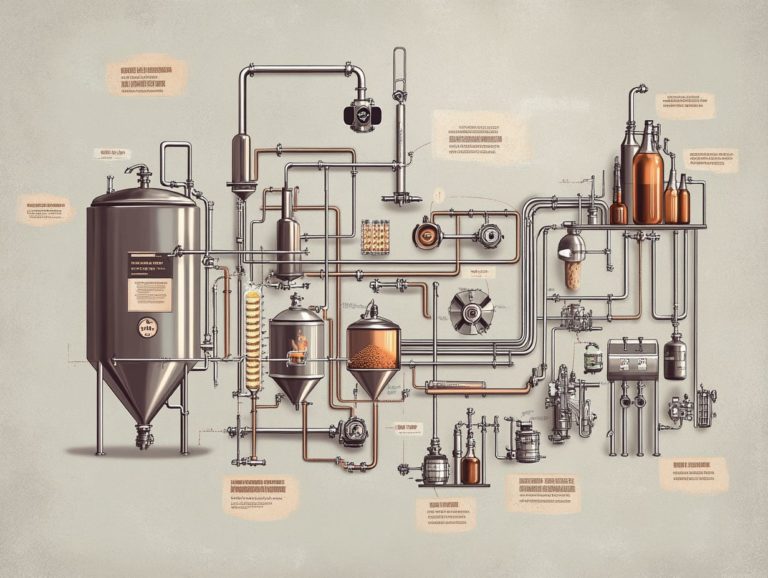Can I Use Regular Kitchen Equipment for Brewing?
Brewing at home offers an exhilarating and fulfilling journey, and you may find yourself contemplating whether your everyday kitchen equipment, such as a fermenter or sanitizer, is up to the task.
From pots and pans to measuring cups, numerous common tools can double as essential companions in your brewing escapades, especially when brewing beer or kombucha.
While it is feasible to utilize these items, it s crucial to consider several important factors, such as the risks of contamination and the possibility of inaccurate measurements.
This article delves into which kitchen equipment can effectively aid your brewing process, including managing fermentation stages, and highlights the potential pitfalls you should steer clear of, such as improper cleaning and sanitizing.
Contents
Key Takeaways:

- Regular kitchen equipment can be used for brewing with careful consideration.
- The risks include contamination and inaccurate measurements.
- Investing in designated brewing equipment is wise for success.
Can Regular Kitchen Equipment be Used for Brewing?
Employing regular kitchen equipment for brewing offers a practical and economical avenue for homebrewers eager to craft their own beer or kombucha, especially for DIY brewing enthusiasts. With a thoughtful approach, the everyday items in your kitchen can transform into critical tools for the brewing process, enabling you to manage fermentation temperatures, aeration, and carbonation without the necessity of specialized brewing gear.
However, it s exciting to discover which items can be safely utilized and the proper methods for cleaning and sanitizing them, possibly using products like Oxi-clean. This knowledge is crucial to prevent off-flavors and contamination, ensuring a successful brewing experience.
1. Pots and Pans
Pots and pans are essential staples in any kitchen. They play a crucial role in the brewing process, especially when boiling wort for beer or prepping ingredients for kombucha.
Choosing the right pot can influence the efficiency of your boil and the flavor profile of your brew. For instance, a stainless steel stock pot is often the go-to choice for many brewers due to its excellent heat distribution and resistance to corrosion, making it perfect for those extended brewing sessions.
A smaller enameled pot could be ideal for experimenting with small batches, as it allows for greater control over the boiling process and flavor integration.
The material of your pot whether aluminum, copper, or ceramic can also interact with the ingredients, enhancing or muting specific flavors. For example, aluminum pots are often used in DIY brewing for their affordability and effectiveness in heat distribution. Don t underestimate the importance of size; a larger vessel can achieve a vigorous, rolling boil essential for certain brewing techniques, while a smaller pot might be more manageable for those just starting out.
These choices are important for a well-thought-out brewing kit and can significantly impact the outcome of your mixture.
2. Strainers and Funnels
Strainers and funnels are critical additions to your kitchen arsenal, particularly when it comes to the fermentation process. Whether you’re transferring liquids between containers or removing solid ingredients from your beer or kombucha, these tools can make a world of difference.
They are also vital for preserving the quality of your brew, helping to manage fermentation stages effectively.
When selecting a strainer, opt for one with a fine mesh to effectively capture unwanted particles, ensuring that no sediment compromises the final product.
Funnels are equally important; they help you minimize spillage during liquid transfers, allowing for a clean operation that prevents contamination.
To elevate your filtration game, consider incorporating coffee filters or cheesecloth within your strainers. Don t overlook the importance of proper sterilization; preparing these tools before use is essential in preventing unwanted bacteria from crashing the fermentation party.
By taking these steps, you ll set the stage for a smooth and successful fermentation process!
3. Importance of Thermometers in Brewing
A thermometer is an essential tool for you as a homebrewer; after all, maintaining the ideal fermentation temperature is crucial for crafting exceptional beer or kombucha, ensuring optimal yeast activity and flavor development. The precision you achieve by monitoring temperature can greatly affect the final flavor profile and overall quality of your brew.
Consider exploring a range of thermometer options, such as digital, infrared, or probe thermometers. These offer quick and accurate readings with minimal fuss, ensuring your brewing temperatures are always on point.
Properly controlling fermentation temperature is vital, as it directly affects yeast activity. For example, if the temperature is too high, a yeast strain might produce undesirable off-flavors; conversely, a temperature that’s too low can leave the yeast sluggish.
By understanding and managing fermentation temperature, you not only set the stage for a successful brew but also elevate your brewing experience, allowing the finest characteristics of your ingredients to shine.
4. Essential Tools: Measuring Cups and Spoons for Perfect Brewing
Accurate measurements of ingredients are absolutely essential in brewing. Investing in a quality set of measuring cups and spoons will elevate the consistency of your beer or kombucha recipes, including precise amounts of Dried Malt Extract and Saaz hops.
When you utilize these tools effectively, you can maintain precise ratios an absolute must for achieving your desired flavor profile, aroma, and alcohol content.
Remember, when measuring dry ingredients like hops or malt, it s crucial to level off your measuring cups or spoons to ensure an accurate quantity. The same principle applies to liquids; pour slowly and make sure the meniscus the curve of the liquid at the surface aligns perfectly with the measurement mark to avoid any discrepancies that could compromise your final product.
By incorporating this meticulous attention to detail, you can significantly enhance your brewing process, resulting in beverages that consistently delight with every batch.
5. Food-Grade Plastic Buckets
Food-grade plastic buckets are incredibly versatile and serve as excellent fermentation vessels for homebrewing. They provide a safe haven for yeast and hops to work their magic on your ingredients, whether you re using dry yeast or liquid yeast.
These containers boast ample capacity, making them perfect for various batch sizes, whether you’re just starting out or have years of brewing experience under your belt. Their lightweight design makes handling and transport a breeze, which is especially beneficial during the brewing process.
Cleanliness is of utmost importance; the ease of cleaning these food-grade plastic buckets allows you to swiftly eliminate any residues or contaminants, ensuring that the integrity of your flavors is preserved throughout fermentation.
Proper sanitization techniques are essential. Neglecting this step can lead to off-flavors that mar your final product, ultimately affecting its quality and your enjoyment.
6. Glass Jars and Bottles
Glass jars and bottles are exceptional choices for showcasing your homebrew creations. They offer a clear view of your beer or kombucha while shielding it from harmful light exposure.
The non-porous nature of glass ensures that the fizz in your drinks is preserved for extended periods, elevating their overall quality and flavor. The airtight seal of glass protects your brew from contamination, safeguarding its integrity against pesky bacteria and unwanted odors.
Follow these best practices to achieve the best results when preparing your glass containers. Thoroughly clean and sanitize with the right solutions to eliminate any residual particles or contaminants. By adhering to these straightforward yet effective steps, you set the stage for a successful fermentation process and achieve a crisp, flavorful final product that you can genuinely take pride in.
7. Can Openers
While it may not be the first thing that comes to mind, a reliable can opener is an essential tool in your homebrewing arsenal. It is particularly useful for effortlessly opening cans of amber DME or other canned ingredients crucial for your recipes.
A sturdy can opener enhances the efficiency of your preparation process, allowing quick and easy access to the key components needed to craft your unique brews, including products like Mangrove Jacks Liberty Bell yeast.
As a homebrewing enthusiast, you understand that the quality of your ingredients is paramount to the final product. A can opener that operates smoothly ensures you maintain that quality by providing easy access without compromising the contents. This seemingly small yet vital tool not only aids in ingredient preparation but also contributes to a more streamlined brewing experience, making it a critical addition to your brewing toolkit.
What are the Risks of Using Regular Kitchen Equipment for Brewing?
Utilizing standard kitchen equipment for brewing may seem convenient, yet it carries risks that every homebrewer should recognize. These include the possibility of contamination, imprecise measurements, and the likelihood of undesirable flavors affecting the final product. Using tap water without proper filtration can also impact the taste and quality of your homebrew.
1. Contamination and Sanitization
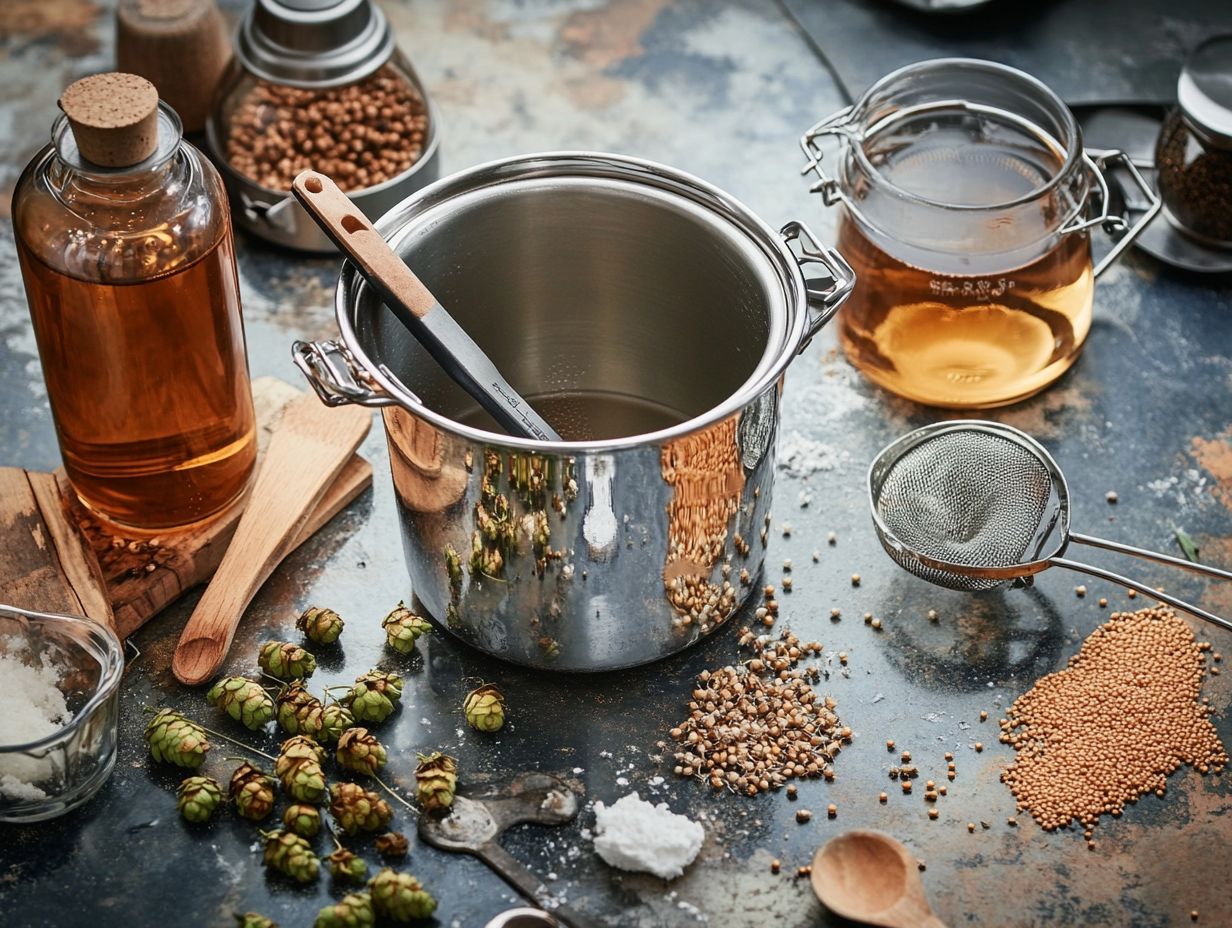
Contamination stands as one of the most significant risks when using regular kitchen equipment for brewing. Improper cleaning and a lack of sanitization can easily introduce unwanted bacteria and wild yeast into your beer or kombucha. Using a brewing kit can help minimize these risks.
These pesky contaminants can result in off-flavors, unpleasant aromas, and even spoilage, all of which detract from your final product. A primary source of these issues often comes from residues left on your brewing equipment, utensils, and even the environment where you brew. Employing a reliable sanitizer like Starsan is essential; it not only eradicates potential microbial threats but ensures that every surface contacting your brew is safeguarded.
When cleaning and sanitizing your equipment, including your fermenter, closely adhere to the manufacturer’s instructions. Allowing sufficient contact time for the sanitizer to work effectively can dramatically reduce the risk of unwanted flavors infiltrating your brewing process, resulting in a cleaner, more enjoyable beverage. Remember to use a hydrometer to measure gravity during the brewing stages.
2. Inaccurate Measurements
Inaccurate measurements of ingredients can throw a wrench in your brewing process, leading to unwanted variations in gravity and ultimately affecting the taste of your final product.
That s precisely why many seasoned brewers stress the significance of using precise tools like hydrometers and refractometers to keep a close eye on specific gravity throughout fermentation. Investing in brewing software can also help track these measurements accurately. The hydrometer, in particular, is a valuable ally; it measures the density of your liquid, helping you calculate alcohol content while also offering a glimpse into the fermentation s progress. Consider using Dried Malt Extract (DME), like amber DME, during the brewing process to achieve desired results.
When these measurements go awry, you risk creating beers with unbalanced flavors or unexpected alcohol levels, jeopardizing a brew that you ve meticulously crafted. Therefore, paying careful attention to detail and developing a solid understanding of these instruments is crucial for achieving the results you desire in your brewing endeavors.
3. Lack of Proper Fermentation Control
Without proper fermentation control, including careful monitoring of fermentation temperature, you may struggle to create the ideal environment for your yeast and hops to flourish, ultimately impacting the quality of your beer or kombucha.
This lack of control can give rise to a host of issues, such as off-flavors that eclipse the intended taste profile, resulting in a final product that fails to meet your expectations. Using a fermentation vessel with a bubble airlock (a device that allows gases to escape while preventing outside air from entering) can help regulate the fermentation stages more effectively. Irregular fermentation conditions can also lead to insufficient carbonation, leaving your beverage flat and less than inviting. Make sure to follow proper priming techniques to ensure adequate carbonation.
As a homebrewer, you might often rely on standard kitchen equipment that struggles to provide the precision needed for effective temperature regulation or humidity control. Investing in a homebrew shop for specialized equipment can make a substantial difference. If not monitored closely, the fermentation process can become inconsistent, leading to variations in taste and texture that could detract from your overall brewing experience.
4. Difficulty in Cleaning and Sanitizing
Difficulty in properly cleaning and sanitizing your kitchen equipment can lead to off-flavors and contamination, significantly compromising the quality of your brewing endeavors.
This issue becomes especially critical when you re working with specialized items like fermenters, siphons, and measuring tools. Consider using Oxi-clean for effective cleaning. Each of these components demands thorough cleaning to prevent any unwanted residues or microbes that could ruin the final product.
Utilizing effective sanitizers is essential, as they eliminate any lingering pathogens that may be present. To ensure that all your equipment is meticulously cleaned before use, adopting a systematic approach is key this involves thorough scrubbing, rinsing, and applying cleaning agents specifically designed for brewing. Don’t forget to employ light protection to avoid any negative effects on your brew.
By embracing these practices, you not only protect the integrity of your brew but also elevate the entire brewing experience. Having a taste test after each batch can help refine your process.
This insightful video by Max Heinegg from Medford Brewing Company shares valuable homebrewing tips. Don t miss out on the chance to elevate your brewing!
Frequently Asked Questions
Can I Use Regular Kitchen Equipment for Brewing?
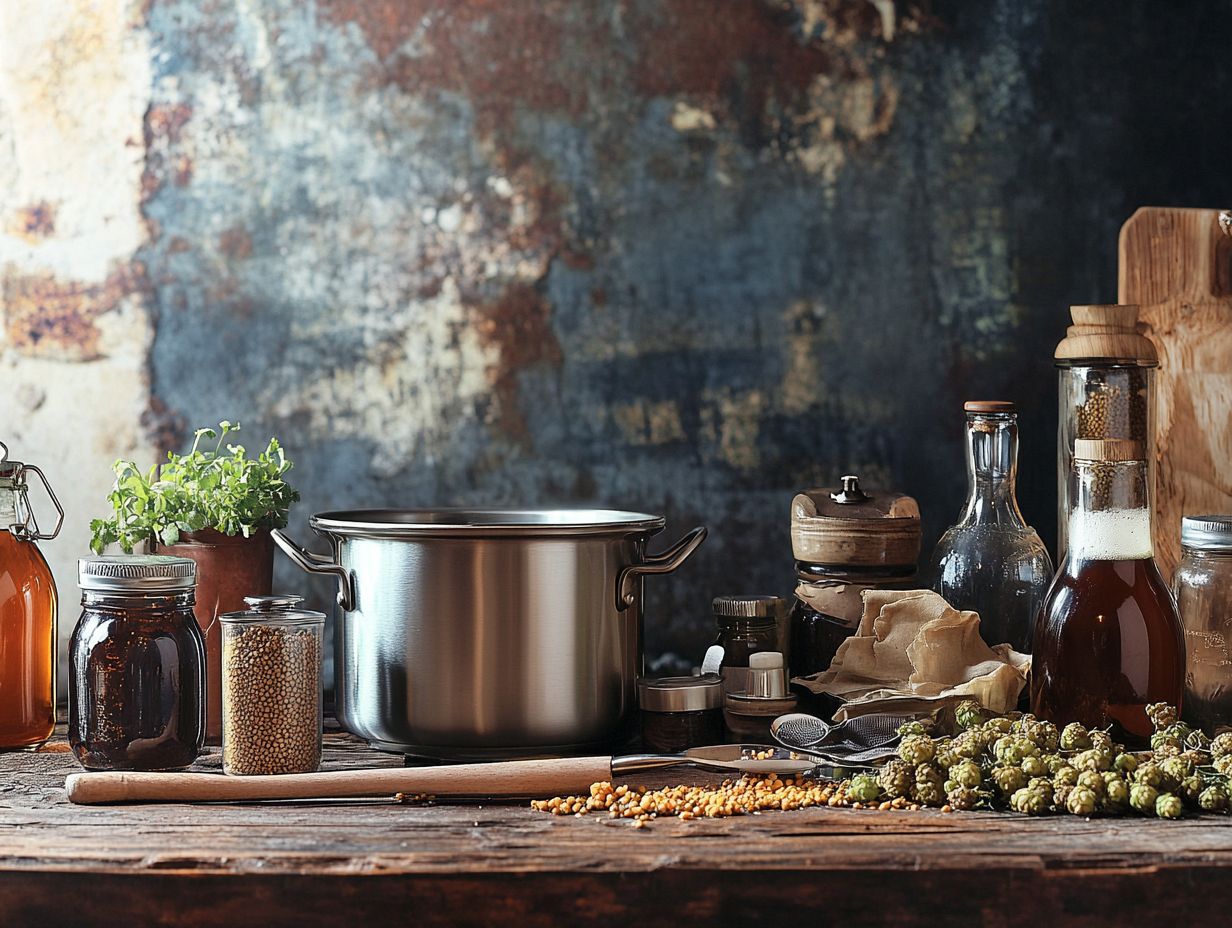
Yes, you can use regular kitchen equipment for brewing. However, it may not always produce the best results. Consider visiting your local homebrew shop for better brewing equipment.
What types of regular kitchen equipment can I use for brewing?
You can use pots, pans, strainers, thermometers, and other common kitchen items for brewing. Just make sure they are clean and sanitized before use. Using DIY brewing techniques can also be effective. Additionally, using a Mangrove Jacks Liberty Bell tool can enhance your brewing experience.
Try out these tips and share your experiences with fellow brewers!
Brewing Equipment FAQs
Can I use a regular stovetop for brewing beer?
Yes, stovetops are commonly used for brewing beer. Monitor the temperature closely and adjust as needed. Using brewing software like Brewers Friend helps in this area.
Do I need special equipment for brewing coffee?
No, a regular coffee pot or French press works fine. For a richer flavor, consider buying a coffee grinder and a pour-over set. You can add Klarheit for a clearer brew!
Can I use regular measuring cups and spoons for brewing?
Yes, regular measuring cups and spoons are suitable. For accuracy, consider buying a scale. Using a plastic soda bottle for priming adding sugar to create carbonation helps you prevent valuable brewing losses!
Are there any kitchen equipment that is not recommended for brewing?
Aluminum, iron, or copper equipment isn’t recommended, as they can react with ingredients and alter the final flavor. Always use filtered tap water to avoid any contaminants.

